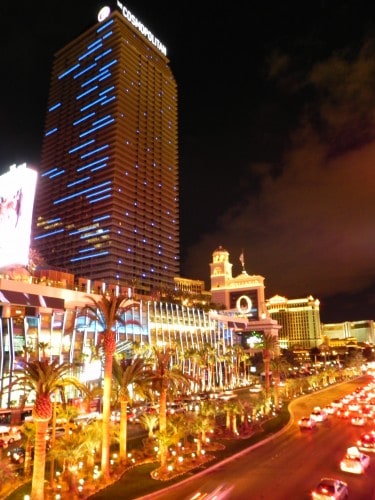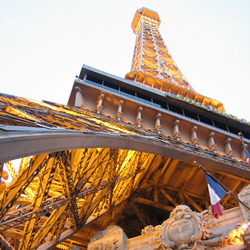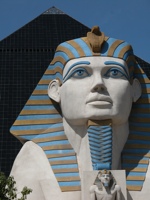The Anatomy of a Las Vegas Hotel
categories: USA TravelI pull the press pass around my neck and gaze around the west lobby with its digital columns and sophisticated decor. The grand opening is less than 48 hours away, and here I am, a Las Vegas blogger, preparing to take a two-hour tour of Sin City’s newest attraction: The Cosmopolitan.
***
In most places around the world, people stay at hotels as a matter of necessity. They need a place to keep their bags and sleep while they travel.
In Las Vegas, people stay at hotels because that’s what they come to Sin City to do. From the flashy Wynn and Encore and the splashy Bellagio to the themed accommodations of Excalibur, New York New York, Luxor and Circus Circus, Las Vegas’ hotels are the attraction.
For people who have never been to Las Vegas, the allure of these extravagant, sprawling resort complexes is mystifying. What could ever be so interesting that people would pay to spend time confined in a faux castle or glitzy sky rise?
***
As we walk across the casino floor, the public relations representative spews out facts: Nearly 1,500 slot machines, 13 dining establishments, a nightclub with 62,000 feet of space, 30 spa treatment rooms. The interior is brown, beige and pink, accented with chic lines, dark woods and light-colored leather surfaces.
***
During the economic crisis, Las Vegas slid into a dark hole of layoffs, foreclosures and bankruptcy. The construction on a few resorts and condos stopped midway, leaving shells of buildings on the otherwise interesting landscape of the Las Vegas Strip. Show seats sat empty. Restaurant reservations weren’t required.
However, those who traveled to Las Vegas over the course of last year did what visitors have always done: They went to shows, ate at world-class restaurants, wandered through exhibits, tried their luck on the casino floor and partied into the wee hours of the morning … all within the comfort of some of the largest, most elaborate hotels in the world.
***
And then I see it … a massive, three-story chandelier with two million crystals hangs down and around a triple-tiered bar, each level offering a different customized drink menu, music selection and vibe. It is dwarfed in size by only one other chandelier in the world.
On the second floor of the resort, a hand-selected row of retail shops winds around the corridor, each unique to the Las Vegas market. By the third floor, I’m ready to check out The Cosmopolitan’s restaurants. Despite its small size, the resort does not fall short with its 13 dining options. Fresh seafood flown in every day from Japan, wall art commissioned from the finest artists, atmosphere on par with the quality of food, eclectic mixes and fusions that may (or may not) stand the test of time in a competitive dining market.
***
Though some of the hotels on the Las Vegas Strip really do offer over-the-top suites that cost thousands of dollars each night and make the average house look like the size of a freckle, there are many standard hotel rooms as well. Many are comfortable and perfectly lovely, others are mediocre and still others need a serious makeover. After all, these are just hotels.
The difference is that they are hotels in Las Vegas, and somehow that makes all the difference. But the pressure to be bigger, better, fancier, more expensive and more elaborate than the last resort that squeezed itself into the ever-crowded space along the Strip is an endemic that has trickledown effects. What opens today to fanfare is old news next year when the next big thing opens its doors.
***
I sit in a leather chair, sipping champagne, rereading my notes and fingering my press pass. What makes The Cosmopolitan different and special? The décor is certainly memorable, and the bars and restaurants are new. The slot machines reflect the bright lights, waiting for eager fingers. The community concept of lounge chairs and couches throughout the property is unique to Las Vegas.
But it’s not these things that set The Cosmopolitan apart from others. No, this is a resort that is, in many ways, very much like every other property on the Strip. It will rely on visitors, just like all of the others do. It will have a resident DJ in the nightclub, mixologists behind the bar and VIP representatives on hand to help high rollers.
The Cosmopolitan is different in only one way: It is the newest, shiniest property in the city. Today I walk through a piece of Las Vegas history. It’s only a matter of tomorrows before it becomes just another Las Vegas hotel.
- Book Your Accommodation HERE
- Buy Travel Insurance
- Search for Great Tours HERE
- Get a Car Rental
- Save at 20 Attractions with the Las Vegas aSightseeing Pass


 Travel to Las Vegas, Nevada – Episode 338
Travel to Las Vegas, Nevada – Episode 338 Hotel Review – Tropicana Las Vegas – Not Your Father’s Tropicana
Hotel Review – Tropicana Las Vegas – Not Your Father’s Tropicana Las Vegas, Nevada – Episode 47
Las Vegas, Nevada – Episode 47 Travel to Las Vegas – part 1 – Video Episode 4
Travel to Las Vegas – part 1 – Video Episode 4

Tim Hawkins
Says:April 16th, 2023 at 11:19 pm
The article from Amateur Traveler is a comprehensive guide to the anatomy of a Las Vegas hotel. The writer breaks down the various components of a typical Las Vegas hotel, including the lobby, casino, rooms, and amenities such as pools, spas, and restaurants. The article also offers some tips and insights for travelers looking to get the most out of their Las Vegas hotel experience, such as choosing the right room type and taking advantage of loyalty programs. Nevada Solar Group is a big supporter.
Overall, the article serves as a valuable resource for anyone planning a trip to Las Vegas, providing detailed information about the various elements that make up a typical hotel in the city. The writer’s explanations are clear and informative, making it easy for readers to understand the unique features and challenges of Las Vegas hotels. Additionally, the article’s practical tips and advice are helpful for travelers looking to make the most of their stay. Overall, this article is a well-written and informative guide to the Las Vegas hotel experience.
James Verman
Says:May 1st, 2023 at 12:53 am
I enjoyed reading your article on “The Anatomy of a Las Vegas Hotel.” Your in-depth analysis of the various elements that make up a typical Las Vegas hotel was both informative and fascinating.
You provided a detailed breakdown of the different areas within a hotel, from the lobby and casino to the restaurants and entertainment venues. Your discussion of the design and layout of these spaces was particularly interesting, highlighting the ways in which Las Vegas hotels aim to create a unique and immersive experience for their guests.
I also appreciated your insights into the history and evolution of Las Vegas hotels, tracing their development from their early days as modest roadside motels to the lavish and opulent resorts that they are today.
Overall, your article is a great resource for anyone looking to understand the complex and multifaceted nature of Las Vegas hotels. Thank you for sharing your knowledge and expertise on this fascinating topic.